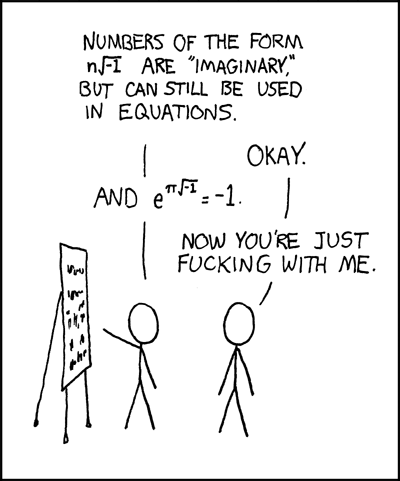Hey
So I was fortunate enough to bare the assignment of writing a four-thousand word essay concerning Math. What I'm having trouble with at the moment is choosing a topic and a research question that falls into what is needed, which is for the research being beneficial for the society.
So I can't go into "The History of Math" or "The History of Calculus" or anything like that. Neither can I have something that is purely Math but non beneficial, for example, at first I wanted to go for Perfect Numbers and researching, testing, and trying to come up with the conclusion which is either Perfect Numbers are infinite or not, but that turned out to not be beneficial.
I am currently in Grade 11, we studied Trigonometry, Quadratic Functions & Inequalities, Functions, Polynomials, Logarithms and Exponentials, Sequences, Series and the Binomial Theorem, and currently Complex Numbers, which is interesting me more than anything else. I would really not mind the topic being something that I still haven't studied, it wouldn't really make a difference other than that if it included anything that I've learned throughly, it would be easier.
One of the past essays on Math that interested me was one trying to come up with a formula to show the amount of different combinations a Rubik's cube can have using the amount of squares, faces, colors, etc as variables, I would really like to have something of that caliber.
Excuse my lack of creativity, thanks!
So I was fortunate enough to bare the assignment of writing a four-thousand word essay concerning Math. What I'm having trouble with at the moment is choosing a topic and a research question that falls into what is needed, which is for the research being beneficial for the society.
So I can't go into "The History of Math" or "The History of Calculus" or anything like that. Neither can I have something that is purely Math but non beneficial, for example, at first I wanted to go for Perfect Numbers and researching, testing, and trying to come up with the conclusion which is either Perfect Numbers are infinite or not, but that turned out to not be beneficial.
I am currently in Grade 11, we studied Trigonometry, Quadratic Functions & Inequalities, Functions, Polynomials, Logarithms and Exponentials, Sequences, Series and the Binomial Theorem, and currently Complex Numbers, which is interesting me more than anything else. I would really not mind the topic being something that I still haven't studied, it wouldn't really make a difference other than that if it included anything that I've learned throughly, it would be easier.
One of the past essays on Math that interested me was one trying to come up with a formula to show the amount of different combinations a Rubik's cube can have using the amount of squares, faces, colors, etc as variables, I would really like to have something of that caliber.
Excuse my lack of creativity, thanks!

